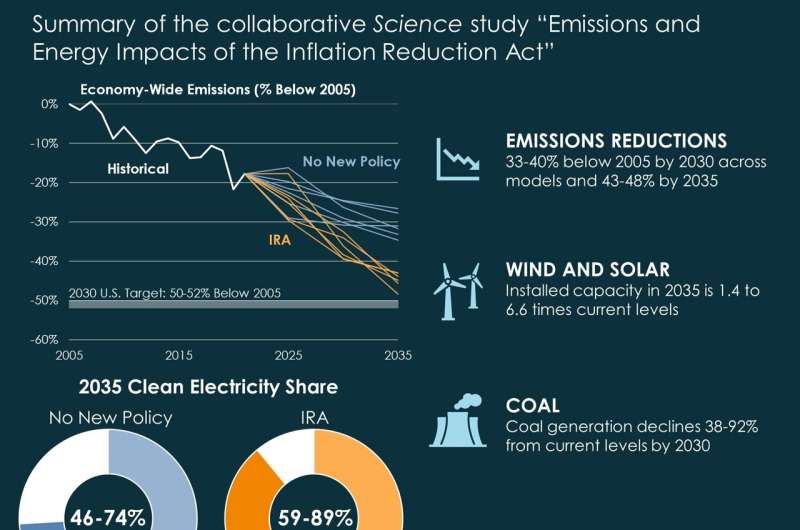June 30, 2023 report
This article has been reviewed according to Science X's editorial process and policies. Editors have highlighted the following attributes while ensuring the content's credibility:
fact-checked
peer-reviewed publication
trusted source
proofread
Passage of Inflation Reduction Act of 2022 already found to be lowering US greenhouse gas emissions

A large team made up of academics and professionals in the private sector from across the U.S. has found that just a year after passage of the Inflation Reduction Act of 2022 (IRA), measurable drops in greenhouse gas emissions have occurred in the United States. The team has published a Policy Forum piece in the journal Science outlining the emission reductions, where they occurred and how they relate to goals set under the Paris Agreement.
The IRA was initiated, changed and finally passed last year as a means of combating the high inflation rate experienced in the U.S. following economic issues related to the pandemic. The goal was to reduce inflation by stimulating the economy via funding projects that would create jobs paying higher than minimum wage. It was part of a larger effort called the Build Back Better Act that passed earlier to provide funds for restoring, rebuilding or simply providing better maintenance for major infrastructure projects, such as federal highways and bridges.
One part of the IRA was insistence by its proponents that funded projects reduce greenhouse gas emissions. In this new effort, the researchers acknowledge that one year is not much time to measure something as large as the effort covered by the IRA, but suggest that monitoring efforts such as theirs can ensure that the goals of the act are achieved over the long term.
The research team began by noting that the IRA, despite its title, is the largest climate funding law ever passed in the U.S. But despite its reach, it will not be enough for the U.S. to meet goals established in the 2015 Paris Agreement from which the U.S. withdrew in 2017. The team then split into 17 groups, each with the goal of comparing nine climate and economic models using emission data collected over the past year to years prior in order to make projections about future emissions.
The team as a whole found that the models showed an average of 43% to 48% emissions reductions by 2035, compared with 2005 levels, which they note represents a significant jump from the year prior to passage of the IRA. Also, all the models showed reductions in the electricity creation sector achieving the greatest drops.
More information: John Bistline et al, Emissions and energy impacts of the Inflation Reduction Act, Science (2023). DOI: 10.1126/science.adg3781
Journal information: Science
© 2023 Science X Network





















